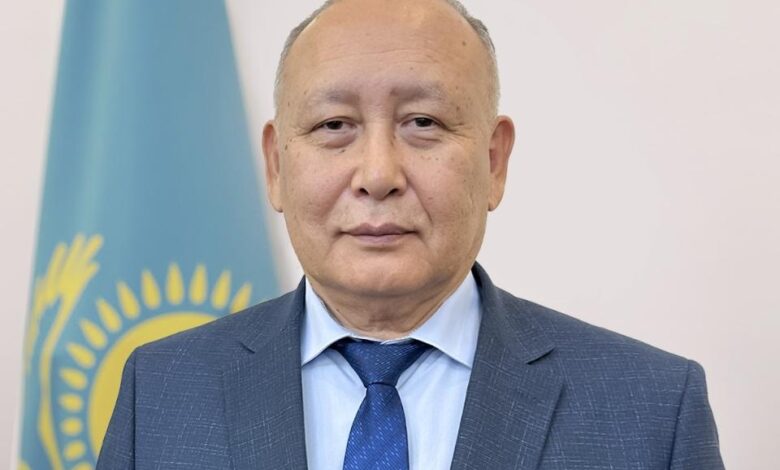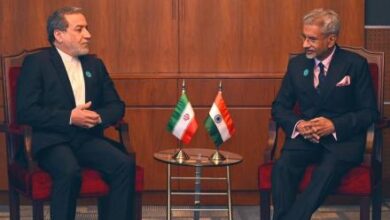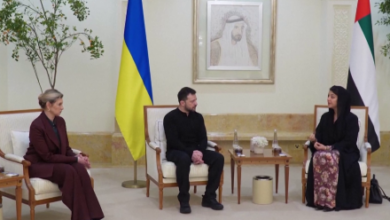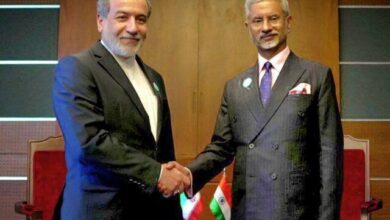Kazakhstan confronts water scarcity head-on

Water scarcity is posing a growing threat to Kazakhstan’s national security. By 2040, the country could experience severe water shortages, with quantities sufficient to meet only 50 percent of its needs, according to a report prepared by the UN Development Programme.
In September 2023, in response to the burgeoning challenges, Kazakh President Kassym-Jomart Tokayev’s administration established a new ministry of water resources and irrigation. A month later, Bolat Bekniyaz was appointed as the first deputy minister. Bekniyaz has extensive experience in water conservation. From 2016-23, he served as the director of the executive board of the International Fund for Saving the Aral Sea in Kazakhstan. During his tenure, the Kazakh portion of the sea experienced a comeback.
Bekniyaz spoke with Eurasianet about Kazakhstan’s new Water Code, the status of the water-sharing mechanism with China, the preservation of Lake Balkhash, the construction of the Qosh Tepa Canal in Afghanistan, the plight of the Aral and CaspianSeas, and international challenges. His responses have been edited for clarity.
Eurasianet: In January, Kazakhstan adopted a concept for managing its water resources through 2030. It includes unprecedented water retention measures. Where will the investment come from?
Bekniyaz: The plan is to build 42 new water reservoirs. Some will be managed by the state. Many smaller ones will be run by akimats [municipalities] and private entities. Half of the funds will come from central and local budgets. Half will be financed by borrowing from the Islamic Development Bank.
Eurasianet: The loan could be as much as $2 billion…
Bekniyaz: The deal is expected to be finalized by the end of the year. It is not only for water management but also for roads and infrastructure. We are bringing in UN institutions, the UN Food and Agriculture Organization, to analyze the viability of the projects.
Eurasianet: Building 42 reservoirs in just five years is a lot of work. Does this sound like a realistic plan?
Bekniyaz: It will be a phased approach. Funds will be released in tranches. If the first is successfully invested, the second will be released, and so on. The reservoirs will be of different sizes. The largest will be built on the Ishim River in northern Kazakhstan. [In April, Tokayev described the spring floods there as a national disaster].
Eurasianet: Your ministry is working on a new Water Code. It has been discussed in the lower house of parliament. Has any progress been made?
Bekniyaz: The current Water Code from 2003 is outdated and has been amended more than 270 times. Many of its provisions do not work because there are no technical regulations to implement them. The code itself is more geared towards economic development.
The new one will have a stronger focus on water conservation. For the first time, river flows will be divided into ecologically critical stretches, where no water can be taken, and stretches where water can be diverted for irrigation. Businesses that use water for technical purposes, such as car washes, will have five years to install water reuse systems. The purchase of water-saving appliances will be subsidized by up to 80 percent.
Eurasianet: What will be done to combat a ‘black market’ in water?
Bekniyaz: Our main tool against this is digitalization. We are installing sensors throughout the water supply system. They will detect if the water flow drops unexpectedly. We also need the authority to react. We can’t just go around and check up on every company. That is forbidden by law. So, if we see discrepancies in the paperwork, we need the authority to take action.
Eurasianet: There seems to be a lot of pressure from business executives and oligarchs who want to develop projects in water protection zones. How do you deal with this?
Bekniyaz: We have a lot of technological improvements in mind. How can we develop oil fields without contaminating drinking water supplies? Another problem is quarry lakes. Can we pump water from them into disused mines? We have to consider the subsurface and environmental regulations.
Eurasianet: Do you expect the code to be passed by the end of this year?
Bekniyaz: We have a working group of more than 90 people in the lower house of parliament, plus an expert community of more than 40 people from non-governmental organizations, associations, and academic institutions. They are all involved in the discussion. The working group meets twice a week. Sometimes members of the upper house join in to keep up to date. Four amendments have been sent to the government for a second review. We hope to have the document approved by the end of December.
Eurasianet: What is the status of the water-sharing mechanism with China? The two countries held a round of talks in January. There has been little word since then. Is an agreement imminent?
Bekniyaz: We have more than 20 cross-border rivers with China, but before the talks started we only had flow data for two or three of them. That is why the negotiation process has taken so long. We had to do the joint inspections to fill in the blanks. For Beijing, this will be the first agreement of its kind. I hope we can achieve it in 2025.
Eurasianet: In the working protocol, there was a line about ensuring the inflow of water that would guarantee the preservation of Lake Balkhash, one of the largest lakes in Asia. Are you concerned that after the referendum on the construction of a nuclear power plant near the lake, the Chinese side will try to exclude this condition from the final document?
Bekniyaz: I think that if the plant is built, its operators should replace the amount of water taken for its purposes by constructing a pipeline to refill the lake or by some other means.
Eurasianet: Do you expect the special status of Lake Balkhash to be mentioned at all in the agreement with Beijing?
Bekniyaz: This special status may be legally enshrined in another act. I cannot comment on this at the moment. But there are laws onthespecialstatusofLakeBaikal in Russia and on the protection of Lake Sevan in Armenia. Why not adopt a similar act for Lake Balkhash?
Eurasianet: An agreement on cross-border rivers is being prepared not only with China. Another one is in the pipeline with Uzbekistan …
Bekniyaz: Our two countries are the only ones in Central Asia to have signed two UN conventions [on the Law of the Non-Navigational Uses of International Watercourses and on Transboundary Watercourses]. With these conventions in sight, we are now working towards a joint agreement. We have mutual understanding on all but two points. The main issue of contention is whether the parties only need to notify each other of construction works on cross-border rivers, or whether they need to give full permission for such works. So far, the talks have been very constructive.
Eurasianet: The Syr Darya and the Amu Darya rivers are both part of the Aral Sea basin system. How does Kazakhstan see the potential impact of Afghanistan building the Qosh Tepa canal to divert water from the Amu Darya?
Bekniyaz: The Amu Darya no longer flows into the Aral Sea. However, the river is of primary importance to [the Uzbek autonomous region of] Karakalpakstan and Turkmenistan, which are closer to its mouth.
Eurasianet: Do you expect a move to include Kabul in the official water quota of the Amu Darya? To date, the Central Asian republics have no water-sharing mechanisms with Afghanistan.
Bekniyaz: I know that both Turkmenistan and Uzbekistan make visits to the Qosh Tepa facility. Afghanistan could join the International Fund for Saving the Aral Sea. But as far as I know, there has been no official statement to that effect.
The construction of Qosh Tepa could affect Kazakhstan if these countries compensate for the lack of water in the Amu Darya by increasing their intake from the Syr Darya, which flows through our territory.
Our response should be digitization and water conservation. We can do this by rebuilding irrigation systems. It also makes sense to switch to 90-day instead of 120-day rice varieties where possible, introduce laser leveling of rice fields, and reuse drainage water in collectors. In this way, we can save half of the 14-15 cubic kilometers of water we use for irrigation.
Eurasianet: The water level of the Caspian Sea has fallen by 1.7 meters over the past two decades. Are we facing a repeat of the Aral Sea scenario?
Bekniyaz: The developments may look the same, but the scenario is actually different. The Aral Sea is fed by mountain rivers and glaciers in the Tian ShanMountains. These are particularly affected in times of global warming. The Aral Sea has been severely damaged by water abstraction for irrigation. The Caspian Sea is fed by lowland rivers such as the Volga. In the south, little water from it is used for irrigation. What we have here with the fluctuation of its water levels is a cyclical development. The Caspian Sea is simply in one of its receding cycles and there is nothing we can do about it.
Eurasianet: Is it possible to predict when this cycle will end?
Bekniyaz: It is very tricky because there are many factors that we have to take into account. There are active earthquake belts in the south, there are tectonic deformations of the seabed. The direction of the wind currents can also play a role.
Eurasianet: What about anthropogenic factors? What can be done to minimize water pollution, an important factor for fishing?
Bekniyaz: We need to adapt to change. Our fisheries and our economy have to come to terms with the new status quo. We also have to accept that some areas are no longer navigable.
Eurasianet: Kazakhstan has two more years as chair of the International Fund for Saving the Aral Sea. Are you satisfied with the progress so far and what is next on the agenda?
Bekniyaz: We have adopted the new Aral Sea Basin Programme and are working on financial instruments and administrative resources for its implementation. These are mainly regional, cross-border projects.
The Fund has been in existence for 30 years. We are now modernizing its organizational and legal structure, implementing changes to make it more responsive. Kazakhstan is pursuing a new water and energy consortium for five Central Asian countries. But this needs to be a consensual decision. The main objective could be to jointly develop energy construction projects and make them economically viable, with support from the World Bank.
Eurasianet:This year, COP29 will be held in Baku from November 11 to 22. How will Astana contribute?
Bekniyaz: In Azerbaijan, we will present the forthcoming One Water Summit, jointly organized by France and Kazakhstan in Riyadh in December. We will draw attention to the issue of preserving inland water bodies and expect concrete, practical solutions supported by the business community.
Also, the French Development Agency, AFD, and the French geological survey, BRGM, have awarded a grant to develop a master plan for the revitalization of Lake Balkhash. We want to create a fish nursery there. We are also considering setting up a foundation, similar to the Aral Fund, to work specifically with this stretch of water. We will try to bring this up at the COP conference.



